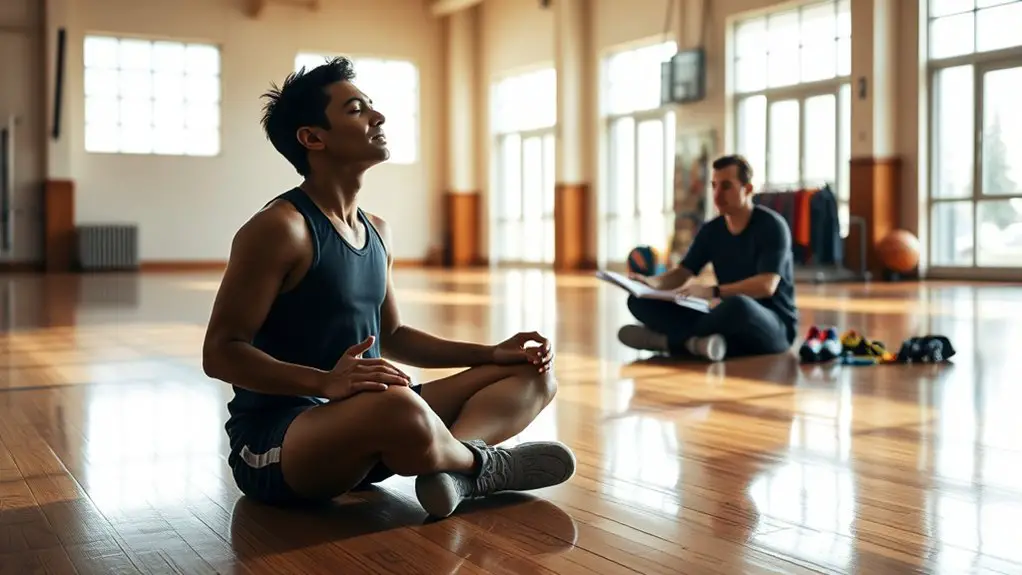Elite athletes use sports psychologists to enhance their performance and boost mental resilience. These professionals help you manage stress, overcome self-doubt, and develop effective coping strategies. They offer tailored techniques like mindfulness and visualization, which can calm nerves and sharpen focus during competitions. In a high-pressure environment, adopting a winning mindset is essential. By working with a sports psychologist, you can access your true potential. There's even more to discover about their incredible impact on performance outcomes.
Understanding the Role of Sports Psychologists
Sports psychologists play an essential role in helping athletes enhance their performance and mental well-being. They guide you in maneuvering the pressures of competition, allowing you to break free from self-doubt and anxiety. By understanding your unique mental landscape, these professionals offer tailored strategies that help you tap into your full potential.
You'll explore techniques like visualization and mindfulness, empowering you to focus and stay present during significant moments. They also encourage open communication, helping you articulate your thoughts and feelings, which can lead to greater self-awareness. This supportive environment fosters a sense of freedom, enabling you to express yourself authentically and pursue your passion without fear of judgment.
With their expertise, sports psychologists help you build a strong mental foundation, making it easier to embrace challenges and thrive in your sport. Ultimately, they help you reclaim your joy and passion for the game. Additionally, they often incorporate mindfulness meditation techniques that enhance focus and reduce anxiety, further boosting athletic performance.
Enhancing Mental Resilience
When you face high-pressure situations, having mental resilience can make all the difference in your performance. It's about coping with stress effectively and building the confidence you need to tackle challenges head-on. Let's explore how sports psychologists can help you strengthen these essential skills. Developing mental toughness can significantly enhance your ability to thrive in tough times.
Coping With Pressure
As you face the intense demands of competition, coping with pressure becomes essential for enhancing your mental resilience. Learning to manage stress effectively can liberate you from the weight of expectations and allow you to perform at your best. Here are three strategies to help you cope:
- Mindfulness Techniques: Practice being present in the moment, focusing solely on your performance rather than potential outcomes.
- Breathing Exercises: Use deep breathing to calm your nerves, helping you regain control when anxiety spikes.
- Positive Self-Talk: Replace negative thoughts with empowering affirmations that remind you of your abilities and strengths.
Building Confidence Skills
Building confidence skills is essential for athletes aiming to enhance mental resilience, especially in high-pressure situations. By working with a sports psychologist, you can identify your strengths and cultivate a positive mindset. Visualization techniques help you picture success, making it easier to perform under stress.
Set achievable goals, breaking them into smaller steps that allow you to celebrate progress. Affirmations can also reinforce your belief in your abilities, reminding you of past successes.
Surround yourself with supportive teammates and mentors who uplift you. Remember, confidence isn't just about winning; it's about trusting yourself to give your best effort every time. By building these skills, you'll not only improve your performance but also enjoy the freedom to express your true potential.
Overcoming Performance Anxiety
Performance anxiety can really hold you back, but there are effective techniques to help manage it. By incorporating mental preparation strategies and visualization exercises, you can shift your focus and build confidence. Let's explore how these tools can transform your approach to competition. Additionally, practicing mindfulness and relaxation techniques can significantly enhance your ability to stay grounded and reduce anxiety during high-pressure situations.
Techniques for Managing Anxiety
When anxiety creeps in before a big game, it can feel overwhelming, but there are effective techniques to help you regain your focus. Here are three strategies you can try:
- Deep Breathing: Take slow, deep breaths to calm your nervous system. Inhale through your nose for four counts, hold for four, then exhale through your mouth for six.
- Visualization: Picture yourself performing successfully. Imagine every detail, from the sounds to the feelings of triumph, to reinforce your confidence.
- Positive Self-Talk: Replace negative thoughts with affirmations. Remind yourself of your skills and past successes to cultivate a winning mindset.
Using these techniques, you can manage anxiety and embrace the freedom to perform at your best.
Mental Preparation Strategies
Managing anxiety is just one part of preparing for competition; mental preparation plays a vital role in overcoming performance anxiety. You've got to develop strategies that empower you, allowing you to channel your energy positively. First, focus on your breath. Deep, controlled breathing can ground you in the moment, helping to clear your mind. Next, think about setting realistic goals. Instead of fixating on winning, aim for personal bests or specific skills you want to showcase. Surround yourself with supportive teammates who uplift you rather than amplify your nerves. Finally, practice self-compassion; remind yourself that it's okay to feel anxious. Embracing these strategies can help you step into competition with confidence and a sense of freedom.
Visualization and Focus Techniques
Visualization techniques can be a game-changer for athletes looking to overcome performance anxiety. By mentally rehearsing your success, you can create a sense of confidence and control that translates to real-life performance. Here are three effective strategies to harness:
- Imagery: Picture yourself executing your skills flawlessly, from warm-ups to the final whistle. Feel every emotion tied to that success.
- Breath Control: Use deep, rhythmic breathing to calm your mind. Visualize each breath as a wave, washing away anxiety and bringing focus.
- Positive Affirmations: Repeat empowering phrases before competition. These mantras reinforce your belief in your abilities and help keep negativity at bay.
Boosting Motivation and Focus
While athletes often face intense pressure to perform, enhancing motivation and focus is crucial for achieving peak performance. You might find that tapping into your intrinsic motivation can reveal a new level of commitment and passion for your sport. Sports psychologists help you identify your personal goals and values, creating a strong foundation for your motivation.
By setting clear, achievable objectives, you can channel your energy effectively. Focusing on the process rather than just the outcome allows you to enjoy your journey and maintain enthusiasm, no matter the challenges.
Moreover, techniques like mindfulness can sharpen your attention, helping you stay present during competition. When distractions arise, you'll be equipped to refocus quickly. Remember, the mental game is just as essential as the physical, and honing your motivation and focus could be the key to revealing your true potential. Embrace this freedom to perform at your best! Additionally, developing mental toughness can enhance your ability to cope with pressure and setbacks, further boosting your performance.
Developing Coping Strategies for Pressure Situations
Pressure situations are a common part of an athlete's experience, and having effective coping strategies can make all the difference in your performance. When the stakes are high, it's essential to maintain your composure and execute your skills. Here are three strategies to help you navigate those intense moments:
- Breathing Techniques: Practice deep breathing exercises to calm your mind and body. Inhale slowly through your nose, hold for a few seconds, and exhale through your mouth. This helps reduce anxiety and center your focus.
- Visualization: Picture yourself succeeding in your sport. Visualizing the perfect performance can boost your confidence and prepare you mentally for the task ahead.
- Positive Self-Talk: Replace negative thoughts with encouraging affirmations. Remind yourself of your strengths and past successes to build resilience in high-pressure scenarios. Additionally, employing mindfulness techniques can further enhance your ability to stay focused and perform under pressure.
Building Confidence and Self-Belief
Building confidence and self-belief is essential for athletes who want to perform at their best. When you trust in your abilities, you're more likely to take risks and push your limits. Sports psychologists help you harness that inner strength by identifying your strengths and areas for improvement. They guide you in setting realistic goals, which can bolster your self-esteem and encourage growth.
Visualizing success is another powerful tool. By imagining yourself achieving your goals, you create a mental blueprint that can translate into real-life performance. Affirmations also play a significant role; repeating positive statements can reshape your mindset and reinforce your belief in yourself. Additionally, incorporating mindfulness techniques can enhance your focus and reduce anxiety, further boosting your confidence in competitions.
The Impact of Mental Coaching on Performance Outcomes
Mental coaching has a profound impact on performance outcomes, as it equips athletes with the tools to manage their thoughts and emotions effectively. With the right mental strategies, you can release your true potential and experience a game-changing shift in performance. Here are three key benefits of mental coaching:
- Enhanced Focus: You'll learn to concentrate on the task at hand, blocking out distractions that can derail your performance.
- Emotional Regulation: Managing anxiety and stress becomes easier, allowing you to maintain composure under pressure.
- Resilience Building: Mental coaching helps you bounce back from setbacks, fostering a mindset that embraces challenges rather than shying away from them.
Harnessing these skills not only boosts your performance but also sets you free from mental barriers, paving the way for achieving your athletic dreams. With the right mindset, you can truly soar in your sport.
Frequently Asked Questions
How Do Athletes Find the Right Sports Psychologist for Their Needs?
Finding the right sports psychologist involves evaluating your specific needs, researching their credentials, and seeking recommendations. Trust your instincts during initial meetings, and make certain their approach resonates with your personal goals and values.
What Qualifications Should a Sports Psychologist Possess?
When choosing a sports psychologist, you should look for relevant degrees in psychology, certifications in sports psychology, and experience working with athletes. Good communication skills and a tailored approach to your needs are essential.
How Often Do Elite Athletes Meet With Their Sports Psychologists?
Elite athletes typically meet with their sports psychologists regularly, often weekly or bi-weekly. These sessions help you maintain mental clarity, enhance focus, and develop coping strategies, ensuring you're always prepared for the challenges ahead.
Are Sports Psychologists Only for Professional Athletes?
Sports psychologists aren't just for professional athletes; they can benefit anyone looking to improve their mental game. Whether you're an amateur or recreational athlete, working with a psychologist can help you reach your personal goals.
What Are the Costs Associated With Hiring a Sports Psychologist?
Hiring a sports psychologist can be like investing in a key to access your potential. Costs vary widely, from a few hundred to thousands per session, but the freedom gained often outweighs the financial burden.




